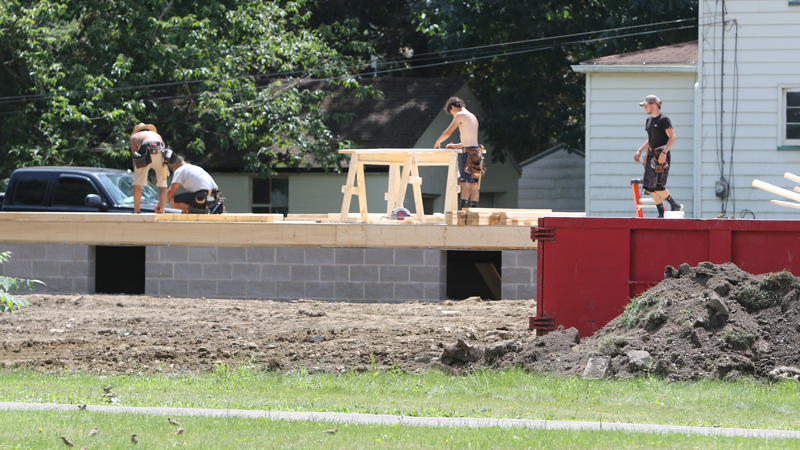Nonprofits build success with partnerships

By GRAIG GRAZIOSI
ggraziosi@vindy.com
YOUNGSTOWN
When it comes to improving the region, there is a sizable gulf between what issues Youngstown city government can effectively accomplish within its budget and what problems private industry can address while still generating a profit.
Within that gulf, problems are left either unaddressed or become the focus of community and nonprofit organizations.
Groups such as the Youngstown Neighborhood Development Corp., the Mahoning County Land Bank and Youngstown CityScape emerged to address some of those issues.
No single group can address everything, however. The organizations that operate in the gulf between the market and the government oftentimes rely on one another to efficiently deal with the challenges facing the region.
The lattice-like network of nonprofits and community action groups is constantly growing and contracting as funding shifts and new problems emerge; what remains consistent, as Deb Flora, executive director of the Mahoning County Land Bank, put it, is their reliance on one another.
“If anyone is thinking of doing any kind of nonprofit work, then they have to understand that collaboration is key. You have to think about who you can work with, you have to have partners,” she said.
As an example: the relationship between the YNDC and the county land bank.
The land bank, thanks to Ohio House Bill 313 and Senate Bill 188, has certain privileges in purchasing land with tax liens or properties that are otherwise distressed.
This helps to deter potentially harmful or predatory land speculation by market entities. It also gives the land bank control over the property, which allows it to be discerning in who ends up with the property.
Enter YNDC. When the organization wants to purchase a house for revitalization or acquire land for a new building, it often does so through the land bank.
Through that collaboration, the YNDC – with the purpose of stabilizing and revitalizing Youngstown’s neighborhoods – is spared from having to compete against private entities for property and doesn’t have to spend extra money dealing with liens.
From there, the YNDC can revitalize a house and place it back on the market, often with the stipulation that the new owners meet certain income requirements and agree that they will inhabit the structure, rather than purchase and resell it or use it as a rental.
Without the land bank, the YNDC has a harder time acquiring properties, and without YNDC, the land bank would be collecting properties only to turn them back out onto into the market to be purchased and – potentially – abandoned again.
Tiffany Sokol, housing director at YNDC, spoke about the organization’s history of working with the land bank.
“I work with them on a near daily basis,” Sokol said. “Our new construction projects on Helena Avenue are a result of seven years of planning and collaboration with the land bank.”
In addition to the region’s general instability, Youngstown is also a food desert, as no major full-service grocery stores exist within the city limits. This is another gap issue; the government isn’t going to open a grocery store, and no private entity has deemed it profitable to open one in the city.
So, again, nonprofits fill the gap.
This time, the collaborative line starts at YNDC.
In an effort to address the food desert, the YNDC has partnered with Mercy Health to sponsor a farmer’s market at B&O Station on the second Wednesday of every month between June and October. During the market, most major food- assistance programs are accepted and, in many cases, doubled, for the purchase of fresh fruits and vegetables.
While most of the vendors at the market are private farms, one of the groups – The GROW Urban Farm based on Youngstown’s North Side – is an arm of the nonprofit group Flying High Inc.
Flying High provides job training to individuals who are looking to transition into new careers in either health care or welding, and specifically who are either recovering from addiction or recently released from prison.
The farm is used as a way to teach the students additional farming and entrepreneurial skills as well as soft skills necessary to function in the work force.
The market provides an avenue for the GROW Urban Farm workers to sell their product and interact with customers face to face – valuable experience for those learning how to hold down a job – and the workers provide fresh produce for individuals living in the food desert.
This year, GROW Urban Farm workers have also teamed up with the Alliance for Congregational Transformation In Our Neighborhoods and the Public Library of Youngstown and Mahoning County to provide food for a pop-up market series throughout the summer. The aim of the pop-up market is to bring a temporary grocery store from neighborhood to neighborhood throughout the summer.
To extend the web one rung further, Flying High recently acquired a piece of property from the land bank that formerly housed a North Side school.
Parker Maynard, Flying High’s director of the GROW Urban Farm, said the land will be used in part by the GROW Urban Farm for berry bushes and an orchard, because their customers – Youngstown residents living in the food desert – have expressed a desire to have access to more fruit.
“We’ve had great opportunities to work with partners, ACTION, the Land Bank, YNDC,” Maynard said. “And that’s really how it has to be doing this work, you can’t expect to be able to accomplish everything alone. You’ve got to work together.”
 43
43
